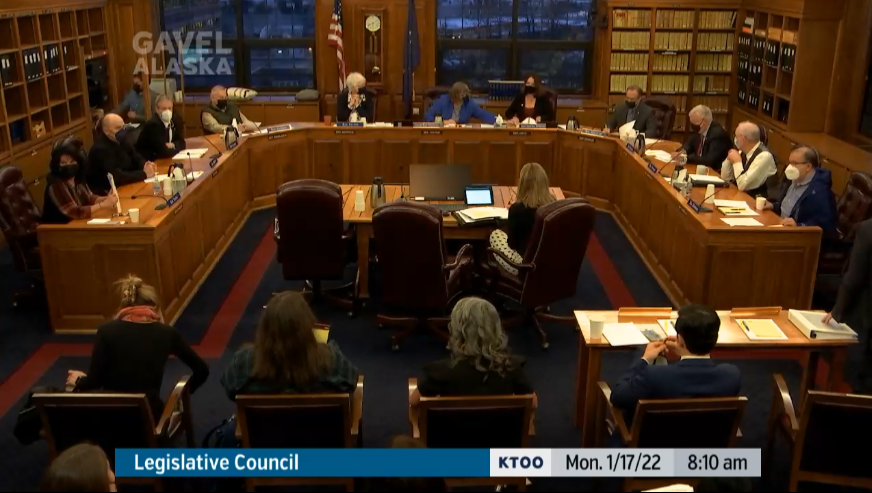
The Alaska Redistricting Board lawsuit is meeting. At issue is access to some executive session records. Claim is they made decisions during one, violating the Open Meetings Act.
In response, board counsel Singer says it's not actually subject to the Open Meetings Act.
#akleg
In response, board counsel Singer says it's not actually subject to the Open Meetings Act.
#akleg
Singer: "The statute simply doesn't apply."
He says the #akleg has no oversight (the Open Meetings Act) over the Alaska Redistricting Board, says it doesn't justify the plaintiffs reviewing the records.
He says the #akleg has no oversight (the Open Meetings Act) over the Alaska Redistricting Board, says it doesn't justify the plaintiffs reviewing the records.
Here's the hearing:
Basically, the Alaska Redistricting Board is arguing that the board's actions are protected by attorney-client privilege.
Judge Matthews asks if the answer to "why did you do something" can be "our attorney told us it was fine and stop there?" and stop there under privilege.
Judge Matthews asks if the answer to "why did you do something" can be "our attorney told us it was fine and stop there?" and stop there under privilege.
Singer says he "guarantees" that board members won't say that, but doesn't really answer.
Matthews returns to it after a bit, would client privilege protect them from having to explain anything?
Singer says, basically, yes, that privilege would bar any further questioning.
Matthews returns to it after a bit, would client privilege protect them from having to explain anything?
Singer says, basically, yes, that privilege would bar any further questioning.
Singer says, basically, to just leave these issues for trial days (so the disputes would eat into the trial time). He says he just doesn't think it's going to come up.
A lot of "take my word that it was all fine" arguments from Singer.
Singer: We don’t want to be here and be painted as obstructionist. It’s not why we created the website.
He's arguing that revealing their legal advice would have the effect of chilling future Alaska Redistricting Boards... from making decisions away from public eyes.
He's arguing that revealing their legal advice would have the effect of chilling future Alaska Redistricting Boards... from making decisions away from public eyes.
Important, for the record, there's were accusations made BEFORE the trial/discovery that suggested stuff was happening behind closed doors:
Senate pairings that changed during pairings.
Borromeo's accusation that Binkley told her that other people needed "to get a win"
Senate pairings that changed during pairings.
Borromeo's accusation that Binkley told her that other people needed "to get a win"
Singer says he's proud that the Alaska Redistricting Board is being sued by under the federal Voting Rights Act.
However, I believe it was. The Board threatened to punt those cases to the federal court unless the plaintiffs dropped the claims, which they did rather than delay it
However, I believe it was. The Board threatened to punt those cases to the federal court unless the plaintiffs dropped the claims, which they did rather than delay it
Wells (atty for the East Anchorage plaintiffs) responding to the last hour+ of Singer's discussion with the judge: "extremely inaccurate and seemed to be intentionally so."
She says it's reason for the trial to proceed cautiously.
She says it's reason for the trial to proceed cautiously.
Now back up is Stacey Stone (Mat-Su plaintiffs). She also says Singer misrepresented her arguments, including the point about the Alaska Redistricting Board threatening to move their case to the federal court over their claims of a Voting Rights Act violation.
Up now is Brena, who's noting that the Alaska Redistricting Board is claiming attorney privilege over an email that the attorneys weren't even involved on that's titled something along the lines of "a path forward."
Brena then holds up a bunch of completely blacked-out pages: "This is what we’re getting, your honor, so let’s cut the B.S. about some theorhetical harm that can be cured at trial time by eating into our trial time. ... I’m tired of playing footsie."
Brena talking about a VRA report to the Alaska Redistricting Board that's being protected under client privilege: "We have every right to know whether Mr. Singer’s characterizations of that report are accurate, truthful and complete."
Brena says that once part of VRA report gets revealed, the whole things must be revealed: "You can't play peekaboo about the privilege. ... You cannot reveal parts of the report that you want to reveal and not reveal the parts that you don't want to reveal."
Brena says that given everything, Judge Matthews needs to review the documents in question to determine whether the privilege claims are actually warranted. Says the court can no longer trust Singer's claims are "fair, legal or appropriate."
Judge Matthews: "Lots to unpack here. I'll get you a decision as quickly as I can."
That's it for the key discovery issues.
Now onto a second issue about the availability of the plaintiffs' expert witnesses' records and work product.
Now onto a second issue about the availability of the plaintiffs' expert witnesses' records and work product.
Still going on here. There's some questions about witness availability.
Attorney for Calista says she's "dismayed that they have not even read our affidavits" that they filed a week ago. She says it's a considerable hardship given some of the witnesses live in rural AK.
Attorney for Calista says she's "dismayed that they have not even read our affidavits" that they filed a week ago. She says it's a considerable hardship given some of the witnesses live in rural AK.
• • •
Missing some Tweet in this thread? You can try to
force a refresh









